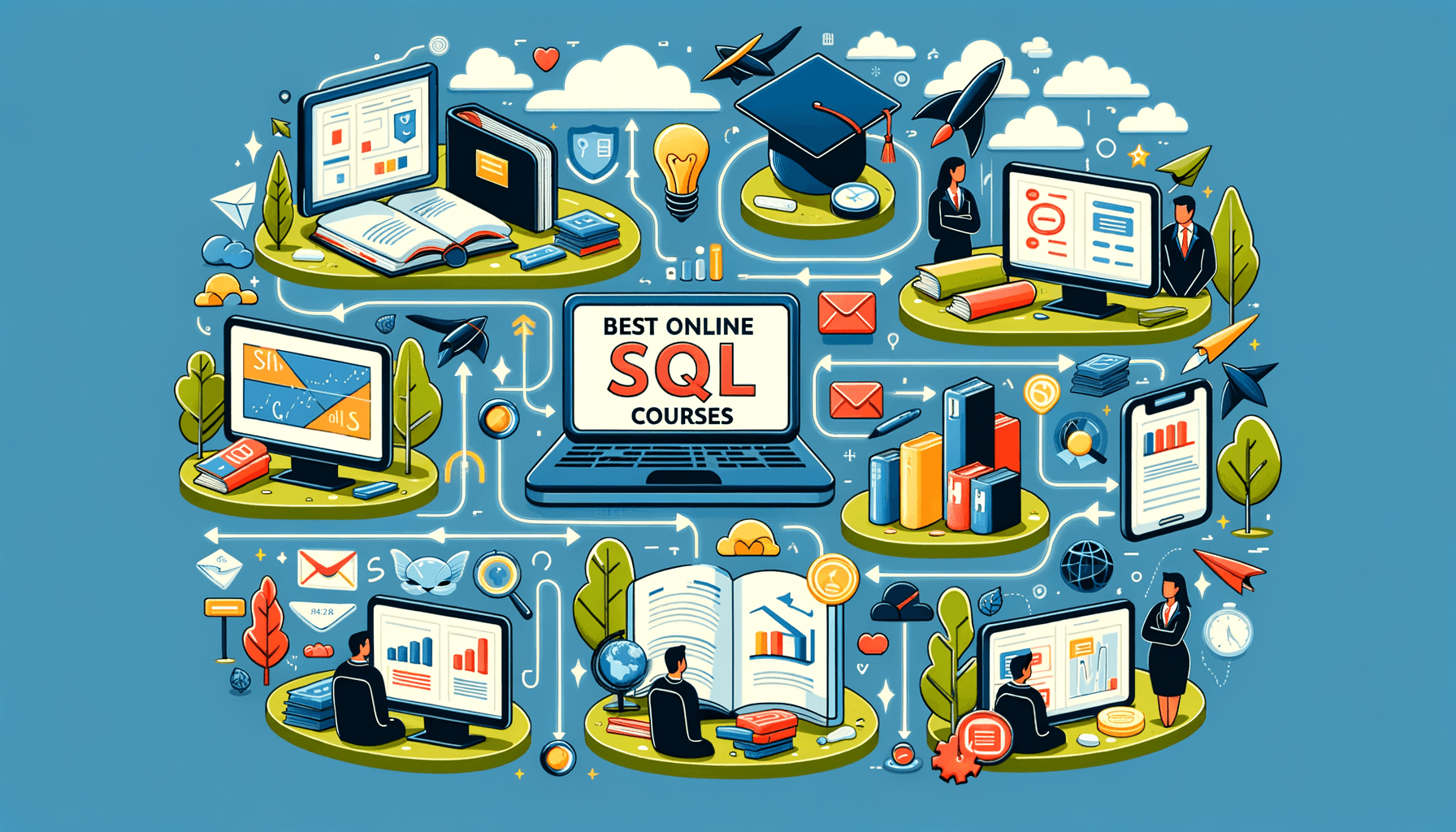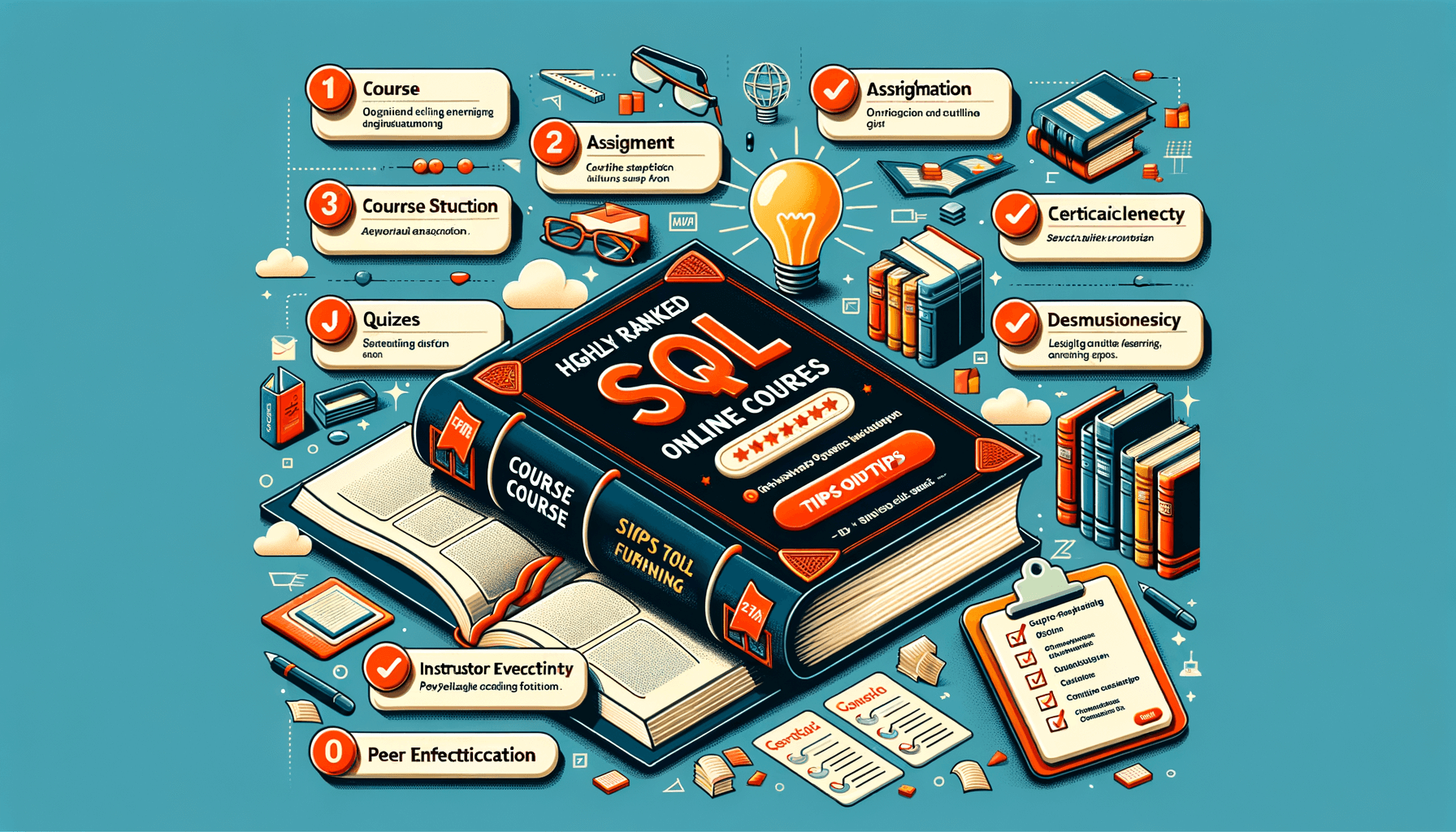A big variety of articles and resources

The Best Online Course for Learning SQL: A Comprehensive Guide
 Sia Author and Instructor
Learn SQL
Sia Author and Instructor
Learn SQL
10 minute read
SQL, or Structured Query Language, is a powerful tool used for managing and analyzing data. Whether you're a beginner or looking to sharpen your skills, finding the right online course can make a big difference. This guide will help you understand why SQL is important and how to choose the best course to learn it.
Key Takeaways
- SQL is essential for data management and analysis in many fields, including business intelligence.
- Choosing the right course depends on the content, the teacher's expertise, and student reviews.
- Top platforms like Coursera, edX, and Udemy offer a variety of SQL courses.
- Effective courses include hands-on practice, interactive tools, and offer certifications.
- Advanced courses cover complex topics like database optimization and SQL for data science.
Understanding the Importance of SQL in Modern Data Management
Role of SQL in Data Analysis
SQL is a powerful tool for data analysis. It helps us sort, filter, and summarize large datasets quickly. With SQL, we can turn raw data into meaningful insights. This is crucial for making informed decisions in any field.
SQL in Business Intelligence
In business intelligence, SQL is the backbone. It allows us to pull data from different sources and create reports. These reports help businesses understand their performance and plan for the future. Without SQL, managing and analyzing business data would be much harder.
SQL vs. NoSQL Databases
SQL and NoSQL databases serve different purposes. SQL databases are great for structured data and complex queries. NoSQL databases, on the other hand, are better for unstructured data and flexible schemas. Knowing when to use each type is key to effective data management.
SQL is essential for anyone looking to work with data. From data analysis to business intelligence, it plays a critical role in modern data management.
Criteria for Selecting the Best Online SQL Course
Course Content and Curriculum
When choosing an online SQL course, the first thing we should look at is the course content and curriculum. A good course should cover all the basics, like SQL syntax, queries, and database management. It should also include advanced topics such as joins, subqueries, and optimization techniques. A well-rounded curriculum ensures that we gain a comprehensive understanding of SQL.
Instructor Expertise and Teaching Style
The instructor's expertise and teaching style play a crucial role in our learning experience. We should look for courses taught by experienced professionals who have a deep understanding of SQL. Additionally, the teaching style should be engaging and easy to follow. Interactive lessons and real-world examples can make learning more enjoyable and effective.
Student Reviews and Testimonials
Student reviews and testimonials provide valuable insights into the quality of the course. Positive feedback from past students can indicate that the course is well-structured and effective. We should also look for reviews that mention specific aspects of the course, such as the clarity of explanations, the usefulness of assignments, and the overall learning experience.
Choosing the right SQL course can significantly impact our ability to master the language and apply it in real-world scenarios. By considering the course content, instructor expertise, and student reviews, we can make an informed decision and select the best course for our needs.
Top Platforms Offering SQL Courses
Coursera
Coursera is a popular platform for learning SQL. It offers a variety of courses from top universities and companies. These courses cover everything from basic SQL commands to advanced topics like mastering PostgreSQL performance and query optimization. The platform also provides hands-on projects to help students apply what they learn in real-world scenarios.
edX
edX is another excellent choice for SQL courses. It features classes from prestigious institutions like MIT and Harvard. The courses on edX are designed to be interactive and engaging, with plenty of opportunities for practical learning. Students can work on real-world problem-solving tasks and gain valuable skills for their careers.
Udemy
Udemy offers a wide range of SQL courses for all skill levels. Whether you're a beginner or an advanced learner, you'll find a course that suits your needs. The platform is known for its expert-led training and hands-on projects, which are essential for mastering SQL. Many courses also include lifetime access, so you can learn at your own pace.
Key Features of an Effective SQL Course
Hands-On Practice and Projects
In our experience, the best SQL courses provide ample opportunities for hands-on practice. Practical skills are crucial for mastering SQL, and projects help students apply what they've learned in real-world scenarios. For instance, sqlskillz.com offers the sqlmicro essentials course for it students and professionals. This course allows learners to gain practical skills, real-world experience, and expert-led training for career advancement.
Interactive Learning Tools
Effective SQL courses often include interactive learning tools. These tools can range from quizzes and coding challenges to interactive dashboards. They help keep students engaged and make learning more enjoyable. Interactive tools also provide immediate feedback, which is essential for mastering complex topics.
Certification and Career Advancement
A good SQL course should offer certification upon completion. Certifications can be a valuable addition to your resume and can help in career advancement. Many employers look for certified professionals when hiring for data-related roles. Additionally, courses that focus on career advancement often include modules on job search strategies and interview preparation.
In summary, the best SQL courses combine hands-on practice, interactive tools, and certification to provide a comprehensive learning experience.
Advanced Topics Covered in the Best SQL Courses
Complex Queries and Joins
In this section, we dive into the world of complex queries and joins. These are essential for anyone looking to master SQL. Understanding how to effectively use joins can make a huge difference in how you manage and analyze data. We cover everything from inner joins to more advanced techniques like self-joins and cross joins.
Database Optimization Techniques
Optimizing your database is crucial for performance. We explore various methods to make your SQL queries run faster and more efficiently. This includes indexing, query optimization, and understanding execution plans. These skills are vital for anyone looking to work in data management or analysis.
SQL for Data Science Applications
SQL is a powerful tool for data science. In this part, we focus on how SQL can be used for data science applications. From data cleaning to data manipulation, SQL is a must-have skill for any aspiring data scientist. We also look at how SQL integrates with other data science tools and languages like Python and R.
Jumpstart SQL: free introductory lessons with hands-on projects, personalized support, and industry insights. Instructor Eric Vanier offers 25 years of expertise in SQL and database management.
Comparing Free and Paid SQL Courses
Benefits of Free Courses
Free SQL courses are a great starting point for beginners. They offer a risk-free way to explore the basics of SQL without any financial commitment. Many free courses provide a solid foundation, covering essential topics like basic queries, data manipulation, and simple joins. One of the biggest advantages of free courses is accessibility; anyone with an internet connection can start learning right away. Additionally, free courses often come from reputable sources, such as universities or well-known educational platforms.
Advantages of Paid Courses
Paid SQL courses, on the other hand, often offer more comprehensive content and advanced topics. These courses usually include in-depth modules on complex queries, database optimization, and SQL for data science. Instructor support is another significant benefit, as paid courses often provide direct access to experts who can answer questions and offer guidance. Moreover, paid courses frequently come with additional resources like downloadable materials, quizzes, and hands-on projects, which can enhance the learning experience.
Which Option is Right for You?
Choosing between free and paid SQL courses depends on your learning goals and budget. If you're just starting out and want to get a feel for SQL, a free course might be the best option. However, if you're looking to gain advanced skills or need a structured learning path, investing in a paid course could be more beneficial. Consider what you hope to achieve and how much you're willing to invest in your education before making a decision.
Whether you choose a free or paid course, the most important thing is to stay committed and practice regularly. Consistent effort will lead to mastery of SQL skills.
Success Stories from Students Who Completed the Best SQL Courses
Career Transitions and Promotions
Many students have shared their success stories after completing top SQL courses. One common theme is career advancement. For instance, several students have transitioned from entry-level positions to more advanced roles, such as data analysts or database administrators. Others have received promotions within their current companies, thanks to their new SQL skills.
Real-World Applications of SQL Skills
Students often highlight how they apply their SQL knowledge in real-world scenarios. From managing large datasets to creating complex queries, the skills learned in these courses are directly applicable to their jobs. Some students have even used their SQL expertise to streamline business processes, leading to increased efficiency and productivity.
Student Feedback and Experiences
Feedback from students who have completed these courses is overwhelmingly positive. They appreciate the hands-on practice and real-world projects that help solidify their understanding of SQL. Many students also mention the supportive community and the valuable insights gained from interacting with peers and instructors.
Completing a top SQL course can be a game-changer for your career. The skills you gain are not only valuable but also highly sought after in today's job market.
Many students have found success after completing our top-rated SQL courses. They have shared their stories of landing great jobs and advancing their careers. Want to be one of them? Visit our website to explore our courses and start your journey today!
Conclusion
In summary, finding the best online course for learning SQL depends on your personal needs and learning style. This guide has explored various options, each with its own strengths and weaknesses. Whether you prefer a structured curriculum or a more flexible, self-paced approach, there is a course out there for you. Remember to consider factors like course content, instructor expertise, and student reviews when making your choice. By taking the time to choose the right course, you can set yourself up for success in mastering SQL.
Frequently Asked Questions
What is SQL and why is it important?
SQL stands for Structured Query Language. It is used to manage and manipulate databases. SQL is important because it helps in organizing and retrieving data efficiently.
How long does it take to learn SQL?
The time to learn SQL can vary. Some people can pick up the basics in a few weeks, while others might take a few months to become comfortable with advanced topics.
Can I learn SQL for free?
Yes, there are many free resources available online to learn SQL. Websites like Coursera, edX, and Udemy offer free courses, though some may charge for certificates.
Do I need a background in programming to learn SQL?
No, you don't need a programming background to learn SQL. It is beginner-friendly and many courses start with the basics, making it easy for anyone to start.
What are the benefits of getting a certification in SQL?
Getting a certification in SQL can boost your resume, make you stand out to employers, and open up more job opportunities. It shows that you have a verified skill set.
Which is better: SQL or NoSQL?
It depends on your needs. SQL is great for structured data and complex queries, while NoSQL is better for unstructured data and flexible schemas.
Related Articles

Mastering Data with an Advanced SQL Online Course
8 minute read






